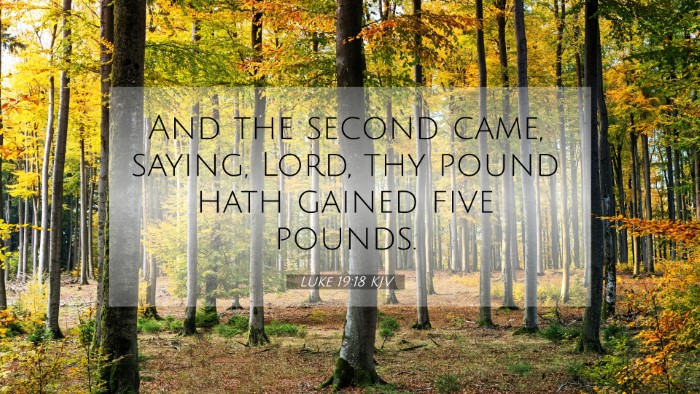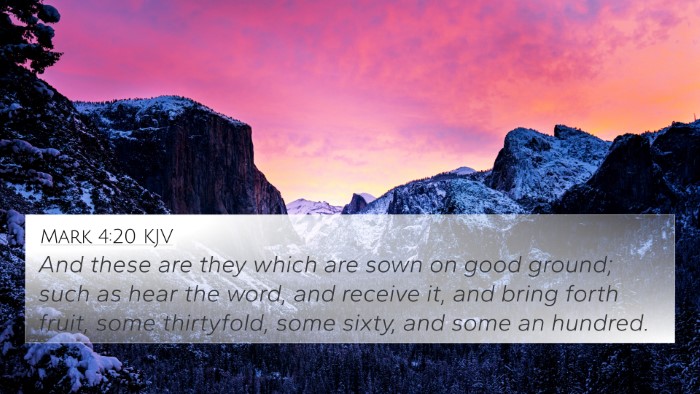Understanding Luke 19:18
Verse Context: In the Gospel of Luke, chapter 19, verse 18, we find a clear illustration of service and responsibility that extends beyond mere possession. This verse states:
"But the second came, saying, 'Your mina, master, has made five minas more.'" (Luke 19:18, ESV)
Summary of Key Insights
The narrative surrounding this verse is part of the Parable of the Ten Minas, which emphasizes the importance of diligent stewardship of the gifts God has given us. Each servant is entrusted with a mina—a form of currency symbolizing potential and responsibility. The second servant's report of doubling the initial investment reflects themes of faithfulness and productivity.
Commentary Insights
Matthew Henry's Commentary
Matthew Henry highlights the expectation of being productive with what we are entrusted with. He notes that the second servant not only preserved his mina but increased it. This serves as an illustration of how believers are called to be active and fruitful in their service to God.
Albert Barnes' Commentary
Albert Barnes emphasizes the notion of accountability. The second servant's success indicates the rewards of hard work and faithfulness. This shows that those who are diligent in their duties will be acknowledged and rewarded, similar to how God rewards believers who utilize their talents wisely.
Adam Clarke's Commentary
Adam Clarke expands on the implications of investment in terms of spiritual growth. He suggests that this parable encourages believers to actively engage in their faith and contribute to the Kingdom of God, illustrating that salvation is not merely a passive gift but a call to action.
Inter-Biblical Connections
This verse connects richly with several themes across the Bible, highlighting stewardship, diligence, and the nature of God's rewards. Here are some key cross-references and thematic connections:
- Matthew 25:14-30 - The Parable of the Talents, which similarly emphasizes using God's gifts for His glory.
- Luke 12:48 - "To whom much is given, much will be required," echoing the idea of accountability in stewardship.
- 1 Corinthians 3:8 - Illustrates the evaluation of each person's work and its reward in God’s kingdom.
- Colossians 3:23-24 - Encourages believers to work heartily as for the Lord, reinforcing the theme of diligent service.
- James 1:25 - The idea of being a doer of the word ties back to actively increasing what has been entrusted.
- 2 Corinthians 9:6 - Highlights the principle of sowing and reaping as a metaphor for spiritual investment and reward.
- Hebrews 6:10 - God is not unjust to forget your work and labor of love, emphasizing faithfulness in ministry.
Thematic Bible Verse Connections
In exploring the themes of this verse, we find numerous links:
- Stewardship: Each servant’s responsibility reflects essential Christian concepts about the management of God’s resources.
- Faithfulness: The rewarding of the diligent servant emphasizes the importance of being faithful in small things.
- Accountability: The returns produced by the servants signify God's expectation that we will yield results from our faith.
- Kingdom Expansion: Each mina represents the capacity for growth within the heavenly kingdom through our efforts.
Practical Applications and Reflective Questions
This parable challenges believers to reflect on their own lives:
- How are you using your talents and resources for God’s kingdom?
- Are you being productive in your spiritual walk, or merely maintaining?
- In what areas of your life can you increase your service to others?
Believers should consider the importance of every mina entrusted to them and strive to increase it, thereby honoring God's gifts with fruitful labor.
Conclusion
In conclusion, Luke 19:18 serves as a powerful reminder of the call to action found throughout Scripture. The second servant's return on investment not only illustrates the principle of stewardship but also encourages Christians to engage actively in their faith. Through diligent service and growth, believers can anticipate the ultimate reward from their master, echoing biblical themes of faithfulness and accountability.





